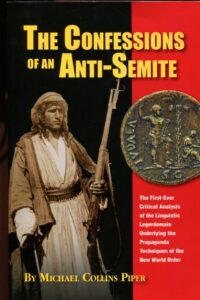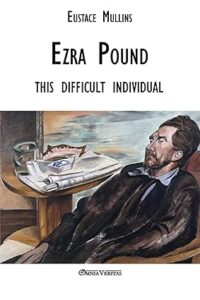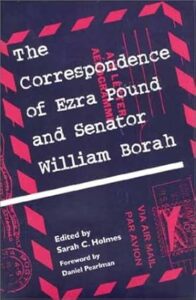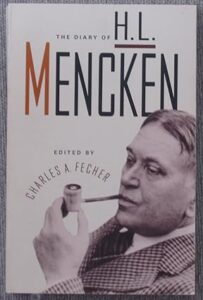Few figures from the 20th century stirred the waters of politics, poetry, and populism quite like Ezra Pound and H.L. Mencken.
As contemporaries of Dennis, both men played important roles in shaping American discourse.
Michael Collins Piper explored their lives, ideas, and controversies in great detail—particularly Pound’s bold views on economics and Mencken’s fierce independence as a critic.
This blog post draws from that rich commentary to spotlight two iconic figures whose words and actions continue to provoke thought and debate today.
Ezra Pound: Poet, Rebel, and Advocate of Honest Money
Another contemporary of Dennis was Ezra Pound—a flamboyant American poet and one of the most influential literary voices of the 20th century.
Pound wasn’t just known for his contributions to literature.
He also became a leading voice for nationalist and populist causes and spoke openly in favor of monetary reform.
In The Confessions of an Anti-Semite, Michael Collins Piper included an extended essay that highlights many of Pound’s most notable remarks.
These were drawn from his controversial English-language broadcasts during World War II, delivered from Italy to American and British audiences.
These wartime broadcasts eventually led to Pound’s arrest.
He was confined from 1945 to 1958 in the St. Elizabeths asylum in Washington, D.C., accused of treason. His “crime” was speaking his mind in his own bold and unfiltered way.
Fun fact: Michael Collins Piper owned a Bible signed by Pound himself. The poet kept it during his time in the asylum. His family later gifted it to a D.C. bookseller, a friend of Pound’s during his imprisonment.
Eustace Mullins and the Legacy of Pound’s Voice
Pound’s ideas were kept alive by others. One of them was Michael Collins Piper’s friend, the populist historian Eustace Mullins.
Mullins met Pound during his time at the asylum and later wrote This Difficult Individual: Ezra Pound in 1961—a memoir recounting their friendship and offering a deep look into Pound’s career.
For those seeking a deeper dive into Pound’s controversial broadcasts, the best source is Ezra Pound Speaking—Radio Speeches of World War II (Greenwood, 1978).
Edited by Professor Leonard Doob of Yale, it compiles Pound’s full political commentary as it was delivered during the war.
Robert H. Walker, an editor at Greenwood Press, noted that while many have heard about these broadcasts, very few have actually read or listened to them.
He emphasized their cultural impact, stating, “No other American—and only a few individuals throughout the world—has left such a strong mark on so many aspects of the 20th century.”
Not all critics were kind.
Some called the broadcasts a chaotic blend of fascist defense, economic theory, anti-Semitism, literary criticism, and personal memory.
Others acknowledged the content’s disorder but admitted it contained “a few pearls of unexpected wisdom.”
Pound’s Writings on Money and Monetary Reform
Ezra Pound had a lasting interest in economics and monetary theory.
One of the best places to explore his views is Impact: Essays on Ignorance and the Decline of American Civilization (Henry Regnery, 1960).
This collection includes his sharp critiques of the Federal Reserve and international finance.
Another recommended read is The Correspondence of Ezra Pound and Senator William Borah (University of Illinois Press, 2001), edited by Sarah Holmes.
The book includes letters between Pound and Borah, a populist senator from Idaho.
Both are also profiled in Populism vs. Plutocracy by Willis Carto.
To explore the key works that influenced the nationalist ideas shaping this tradition, see Books That Shaped My Nationalism and Rejected Globalism.
H.L. Mencken: The Sage of Baltimore
H.L. Mencken was another towering figure from this era. A journalist and cultural critic known as the “Sage of Baltimore,” Mencken was a proud nationalist and populist—qualities that made him a favorite of Michael Collins Piper.
Mencken’s essays covered all manner of political and literary topics, and his influence was so great that Carto later took over the journal Mencken founded, The American Mercury.
For those unfamiliar with Mencken, Marion Rogers’ biography Mencken: The American Iconoclast (Oxford University Press, 2005) offers a well-rounded and objective portrait.
Readers wanting a more personal view of Mencken’s worldview should explore The Diary of H.L. Mencken (Knopf, 1989), edited by Charles Fecher.
Fecher caused a stir by calling Mencken an “anti-Semite” in the introduction to the diaries.
However, Michael Collins Piper clarified that this was a simplistic label.
Mencken, like many intellectuals, held critical views of political activism but also had deep personal ties with several Jewish colleagues and friends, including publisher Alfred Knopf and critic George Jean Nathan.
In fact, Mencken helped elevate the careers of several Jewish writers.
He was also skeptical of Christian fundamentalists and many other groups—not just Jews.
While Fecher seemed shocked by comments in the diaries, Mencken’s public writings had often been even more provocative.
For a balanced view of Mencken’s thoughts on Jewish matters, Michael Collins Piper recommended an extended article he wrote for The Barnes Review, published in its May/June 1999 issue.
Mencken’s Writings Still Matter
All things considered, Mencken was an American original.
Allegations aside, his writings remain valuable and thought-provoking.
Whether you agree or disagree with him, Mencken’s voice stands as a powerful example of fearless commentary.
For a comprehensive overview of the movements that Ezra Pound and H.L. Mencken were part of, read Understanding Populism and Nationalism in America.
The Enduring Relevance of Pound and Mencken
Both Ezra Pound and H.L. Mencken left behind a legacy that still resonates with readers today.
Their willingness to challenge mainstream thought, speak truth as they saw it, and promote populist ideals continues to inspire debate.
Through their writings, correspondence, and controversies, they offered unique perspectives on politics, money, culture, and society.
Thanks to writers like Michael Collins Piper, their contributions—however misunderstood or maligned—are preserved for future generations to examine with fresh eyes.
These two giants of American thought may not have been universally admired, but they were impossible to ignore.
And in a time where conformity often takes precedence over clarity, their independent spirits remain worthy of study and reflection.




